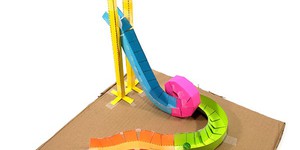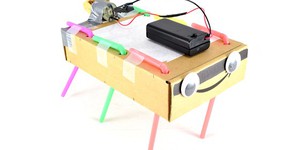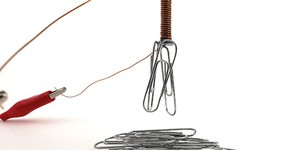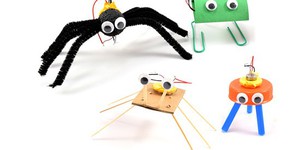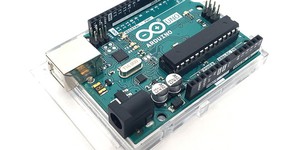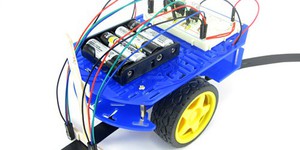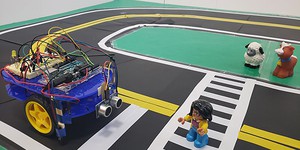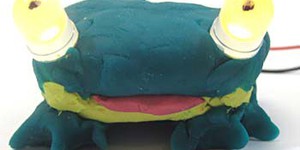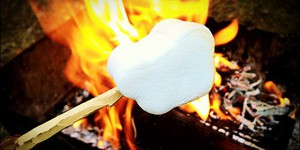Lesson Plans (14 results)
Free science lesson plans designed to engage students through hands-on experiments and activities. Chemistry, life sciences, physics, engineering and more, for elementary, middle and high school teachers.
|
Select a resource
Sort by
|
Lesson Plan
Grade: 6th-8th
24 reviews
What goes up, must come down in this thrill-seeking lesson plan! How much energy does a roller coaster car need to make it through a loop? In this lesson your students will learn about kinetic and potential energy as they build their own roller coasters from simple classroom materials.
Read more
NGSS Performance Expectations:
Lesson Plan
Grade: 6th-8th
7 reviews
Junkbots are easy-to-build robots that you can make using a simple circuit and some recyclable materials. In this lesson, your students will learn about engineering design as they compete to build the fastest robot. No previous robotics experience is required!
Read more
NGSS Performance Expectations:
Lesson Plan
Grade: 6th-8th
Making an electromagnet from a battery, nail, and wire is a classic science demonstration. But instead of just demonstrating this for your students, let them explore it themselves! In this lesson they will discover how different variables affect the strength of an electromagnet.
Read more
NGSS Performance Expectations:
Lesson Plan
Grade: 3rd-5th
3 reviews
Vibrobots are tiny robots powered by a vibrating motor, like the type found in cell phones. In this lesson plan, your students will learn about engineering design as they build their own vibrobots from craft materials. No previous experience with robots is required!
Read more
NGSS Performance Expectations:
Lesson Plan
Grade: 6th-12th
7 reviews
This lesson plan will introduce your students to physical computing: the process of building circuits and programming a microcontroller (an Arduino UNO®) to interact with them. The lesson is broken into seven activities that will walk your students through the basics of setting up the Arduino and interacting with circuit parts like LEDs, buttons, and resistors. This introductory material will help prepare your students for more advanced Arduino projects.
Read more
New
Lesson Plan
Grade: 6th-12th
Create a two-part system for filtering greywater. Teams will focus on communication and systems engineering as they build separate components to filter solid and liquid waste and then combine them into one device.
Learning Objectives
Students will:
Consider the potential effects of drought and how greywater could be part of the solution.
Design a system for filtering out solid waste or liquid waste.
Consider effective communication strategies with their team.
Collaborate on their design…
Read more
Lesson Plan
Grade: 6th-8th
Have your students read about autonomous (also called self-driving or driverless) cars in the news? How can you build a car or a robot that will stay on the road without a human driver? In this project, your students will find out by building a robot that can automatically follow a line around a homemade race course, while learning about the electromagnetic spectrum and electronic circuits.
Read more
NGSS Performance Expectations:
Lesson Plan
Grade: 8th-12th
2 reviews
This eight-part lesson will guide you through building and programming Arduino-controlled autonomous cars with your students. Each part contains a detailed step-by-step video and a supplemental lesson plan PDF with learning objectives, assessment opportunities, and appendices with circuit diagrams and example code. You can present the material yourself or have students follow along with the videos and pause to work on their autonomous cars.
Read more
NGSS Performance Expectations:
Lesson Plan
Grade: 8th-12th
1 review
In this STEM lesson, students will build a mini popsicle stick drone and use feedback control with an Arduino and an ultrasonic sensor to control the drone's altitude.
Read more
Lesson Plan
Grade: 4th
3 reviews
If you love doing arts and crafts with your students, this lesson plan is for you! Teach them about energy, electricity, and circuits as they build light-up sculptures, using something they are all familiar with—play dough! Clear step-by-step instructions are provided and no previous experience with circuits is required.
Read more
NGSS Performance Expectations:
Lesson Plan
Grade: 6th-8th
4 reviews
Your students might know that they can burn calories, but do they know what a calorie really is? In this fun lesson plan, your students will measure the energy content of food by literally burning it using a device called a calorimeter that they will design and build themselves. This will get your students thinking about the chemistry of energy transfer as well as good nutrition, and gives a whole new meaning to the phrase "burning calories!"
Read more
NGSS Performance Expectations:
|
Explore Our Science Videos
How to Make an Archimedes Screw - STEM Activity
Model Your Blood Flow – STEM activity
Make Candy Gears - STEM activity


